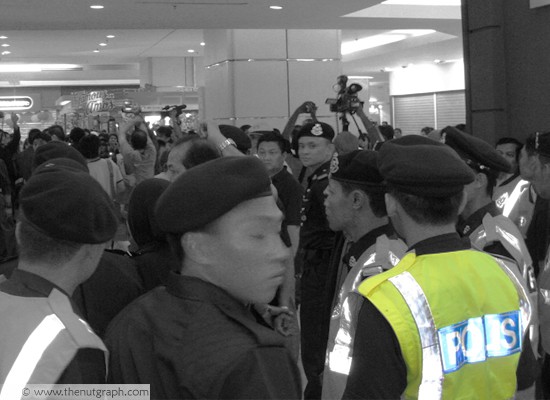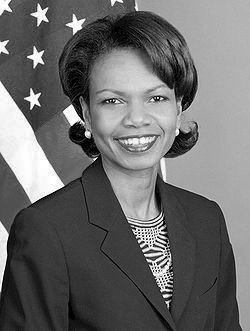Sideways by Deborah Loh | 05 August 2010 | The Nut Graph,
BN MP: It’s not okay to break the law, in this case the Police Act, which regulates public assembly, to protest another law that you disagree with, the ISA.
Young lawyer: Civil disobedience, in this case, the breaking of one unjust law to protest another unjust law, is okay.
Can one wrong be used to correct another? Should bad laws be obeyed? Is this even a concept that the BN understands?

Police at the scene of the anti-ISA rally in Petaling Jaya on 1 Aug 2010
The argument, as with most debates on Twitter, went nowhere. The young lawyer recalled apartheid in South Africa, the murder of Jews in Nazi Germany, and racial segregation in the US as examples of unjust laws which should, and were, opposed. The MP retorted that Malaysia could not be compared to those states which were “tyrannies”. The MP suggested that people ought to accept the Police Act as it was the law, and leave the courts to decide whether the Act contravened the Federal Constitution’s guarantee on freedom of assembly.
The argument finally hit a wall when the MP said the lawyer was politicising the issue. The lawyer denied this and said it was the MP who had politicised it first.
These days, that’s how ideological discourse in Malaysia ends. Whatever is pro-reform, supports human rights, and calls for more freedom and transparency smacks of an opposition agenda. And the opposition does indeed politicise such issues, which is not always helpful in public education about civil liberties.
That said, not everyone who supports having more civil liberties is pro-opposition. And this strikes me as too nuanced a notion for many BN politicians to grasp – that one can be pro-human rights but nonpartisan as well. It is as nuanced as saying that what is unlawful is not necessarily wrong. Indeed, the law doesn’t necessarily or always uphold what is right or just or good.
It is easier for the ruling party to lump civil society and the opposition together than to see beyond politics to the core of unjust laws like the ISA and the Police Act. For certain, it’s also in the BN’s interest to not admit that indefinite detention without trial is inhuman, and that the Police Act violates Article 10(1) of the Federal Constitution on the right to peaceful assembly.
Following conscience

Wilberforce, Gandhi and Parks (Public domain | Wiki commons)
Throughout history, challenges to the status quo have always begun with the act of one or a few persons following their conscience. William Wilberforce, the British MP who campaigned against slavery. Dietrich Bonhoeffer, a Christian minister who plotted Hitler’s assassination because he saw it necessary to oppose such evil. Rosa Parks, who defied segregation laws and sparked off mass protests in the US civil rights movement.
Closer to our region, José Rizal was executed for writing social commentaries and novels that inspired dissent among Filipinos against their Spanish colonisers. Mahatma Gandhi led India to independence by non-violently resisting the British. More recently, in 2007, Buddhist monks in Burma marched, at great peril to themselves, in protest against the military junta.
Malaysia itself has a history of civil disobedience, despite what leaders today say about protests not being part of our culture. Indeed, that was how the country was formed. Thousands of Malays demonstrated against the Malayan Union in 1946, paving the way to independence. Men like Penghulu Dol Said of Naning resisted the British by refusing to pay taxes and surrender his territory, resulting in a bloody war. Other early freedom fighters were Datuk Maharaja Lela of Pasir Salak, who assassinated British resident JWW Birch; Datuk Bahaman, Tok Gajah and son Mat Kilau, and Tok Janggut, all of whom clearly broke the law to lead rebellions against the British.
Pressuring Parliament
The BN MP and the young lawyer weren’t the only ones debating civil disobedience on Twitter. Other Twitterers, too, were giving their views on the police’s handling of the anti-ISA protesters. Some, quite obviously in support of the ISA and laws against public assembly, said the police should not be blamed as they were merely upholding the law. Their argument was, if you want to have public assembly without a permit, get Parliament to change the Police Act instead.
It’s an argument that, again, ignores the core of what makes the ISA unjust and the Police Act unconstitutional. This argument says that whether a law is good or bad is a separate issue for legislators. What matters is that as long as it is law, you must obey it. It fails to see that the act of holding a candle in protest is itself a call to Parliament to change bad laws.
Let’s also look at the realities of our Parliament, where the legislative agenda is decided by the executive. Then, consider amending the Police Act on public assembly. Would the executive even table such changes in the first place? If an opposition or independent MP were to move a motion or a private member’s bill for the Act to be amended, would it see the light of day? In the past, similar attempts by opposition MPs have been thwarted.

Rice (Public domain | Wiki commons)
Responding to the public
How, then, should those in power respond to civil disobedience? For one, more politicians from the ruling party must learn to distinguish what is lawful but unjust from what is just but made illegal. And they must learn to understand civil disobedience as a moral force in history.
Secondly, that arresting people at peaceful protests is no longer an effective deterrent against future vigils. The authorities should have realised this from the Hindraf and Bersih rallies of 2007, and from the numerous anti-ISA and Perak vigils that have taken place since then until now. It makes more sense to let protesters express themselves for they will tire after awhile and disperse, than to deploy water cannons, tear gas and security personnel for nothing more than a brute show of force.
Thirdly, it can show the electorate that it can rise above politics and deal with civil liberties based on justice and universal principles of human rights by amending or abolishing unjust laws. Given the government’s stubbornness, however, that would likely need a revolution.

No comments:
Post a Comment